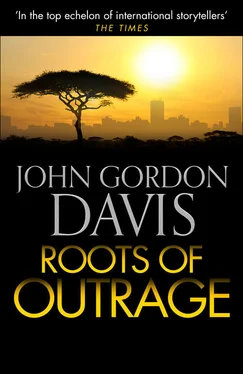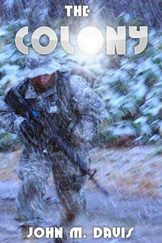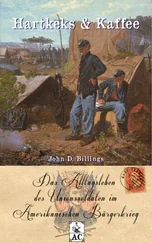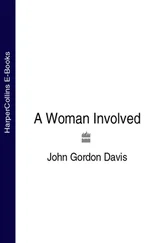Enter Ernest Mahoney of New York, sent thither by the Harker-Mahoney Shipping Company to investigate trading opportunities in this opening-up of the African hinterland. A hundred and twenty years later, when Ernest’s great grandson, Luke Mahoney, read his forebear’s journals of that epic time, he could visualise the meeting of shareholders in New York, the rotund old chairman, Ernest’s grandfather, saying:
‘The Mahoneys were amongst the first to transplant the principles of our magnificent American Revolution across the oceans . .. Amongst the first to seize the unspoilt virtue of our frontier heritage and reject the wiliness of the Old World, “its useless memories and vain feuds”, amongst the first to shun the tawdry lures of Europe and export our American Enlightenment by the adventurous prows of the Harker-Mahoney clippers to replace wars and so-called diplomatic treaties with the benign embrace of commerce … the first to join with those Massachusetts poets in their cry:
Preserve your principles, their force unfold
Let nations prove them and let kings behold.
EQUALITY, your first firm-ground stand;
Then FREE ELECTIONS; then your FEDERAL BAND.
‘We were amongst the first to see that political happiness would eventuate throughout the world from the simple principle of free oceans, free trade, and the free dissemination of American inventiveness by Yankee vessels, and that, in return, the world would unfold its treasures … The Mahoneys were amongst the first to turn America’s eyes to the Pacific, and to Africa, to probe dark regions of alien religions which would, through our worthy commerce, fall to the influence of our Enlightenment … And we all know what the result is: Harker-Mahoney has, without firing a shot except in self-defence, an empire upon which the sun never sets … And now there is a new frontier for Harker-Mahoney to add to their empire, brethren shareholders! It is the hinterland of southern Africa!
‘“The hinterland”? you ask. We have traded profitably with the Cape of Good Hope for years, but how do we penetrate the hinterland? Ah … It is being penetrated for us by the Dutch Boers, just as our west is being opened up by our pioneer wagons! Whole new lands that will one day stretch to the Nile, vast new untapped markets for our goods, vast new resources, lands bigger than the whole of China …’
And so now here is nervous Ernest Mahoney, twenty-two years old, lanky, wan – a graduate of a Presbyterian seminary but feeling unable to take holy orders because of lusts of the flesh – disembarking with a big bagful of silver dollars, buying two horses, hiring a Dutch guide (paying twice what he should and thinking it cheap), setting off timidly into the wilderness to spread the American Enlightenment through worthy commerce. Ernest riding up into the highveld, overtaking Boer wagon trains, eventually coming upon the high mountain called Thaba Nchu, the foregathering place. The hundreds of wagons outspanned, the thousands of Boers waiting for their leader, Hendrik Potgieter, who had trekked on to the north to explore, for Piet Retief to come up from the south. There is Ernest fearfully riding on north with his guide to look for Hendrik Potgieter’s wagon train, following his tracks; the veld is littered with evidence of the Mfecane, whitened skeletons, burnt huts. Ernest eventually finds Potgieter and his people feverishly preparing for an imminent attack by Mzilikazi, lashing their wagons into a circle, stuffing thorn branches into the gaps. And so Ernest, four weeks in Africa, never having fired a shot in anger, who just wants to get the hell out of this land, finds himself plunged into one of South Africa’s most famous battles. And he meets Sarie Smit, the feisty Boer girl assigned to him as a loader because she speaks English.
The Battle of Vegkop. The veld black as ink with five thousand of Mzilikazi’s warriors loping across the veld chanting Zhee Zhee , encircling the wagons, sharpening their assegais, humming, humming for hours until Potgieter tied a red rag to a stockwhip and waved it above the wagons as a challenge. Then their terrifying battle charge, thousands of glistening warriors hurling themselves at the laager, stabbing, slashing, hurling, the wagons shaking under their tumult midst the cacophony of the trekkers’ muzzle-loaders, the smoke and stink of gunpowder. And there is Ernest, sick-in-his-guts terrified, blasting straight into the savage faces through the thorn branches, thrusting the spent gun at Sarie and grabbing the reloaded one she thrust back – bang – grab – bang – grab – bang – There is sweaty Sarie Smit and her mother pouring the powder down the hot muzzles, ramming in the lead with a wad of cotton on top, thrusting the gun in Ernest’s trembling, outstretched hand – bang grab bang … For hours the cacophonous battle rages, and the bloody black bodies are piled high around the laager before Mzilikazi’s warriors withdraw, round up all the voortrekkers’ thousands of cattle and drive them off northwards. Potgieter sends horsemen galloping back to Thaba Nchu to call for oxen, and Ernest volunteers to ride with them. It is regarded as a courageous offer, for more Matabele impis may be waiting, but Ernest just wants to get the hell out of there. And when, eight days later, he arrived at Thaba Nchu, he would have kept going, heading south to the faraway sea to take the first ship back to America, except that no way was he going to ride alone through this fearsome country.
Piet Retief had arrived at Thaba Nchu, where he had been elected Governor of the ‘United Laagers’, and he sent oxen up to Vegkop to haul Potgieter’s wagons back. But the United Laagers were disunited at the outset, a characteristic of the Boers throughout their history. Retief wanted to establish the republic in the east, with a land grant from the Zulu king, while Potgieter wanted to recover his cattle stolen by Mzilikazi, drive him from the land and establish the republic in the north. So there is vengeful Potgieter setting out northwards to deal with Mzilikazi, there is Piet Retief setting out eastwards to the land of the fearsome Zulus. And with Retief’s wagons rolls that of Sarie Smit’s family. And Ernest rides with them. And his fate is sealed.
‘I at last know the meaning of love,’ Ernest breathlessly confides to his journal. There is Ernest having the first real live sexual affair of his life, waiting excitedly each night outside the glow of the laagers’ campfires for Sarie to come creeping out. There is Ernest earnestly proposing marriage in the moonlight (after praying to the Lord for guidance), ‘ begging her to return with me to the comfort and security of America once my duties are completed – but alas, she insists her loyalties are to her volk … ’ There is Ernest travelling on his delicious illicit honeymoon across the highveld until Retief’s convoy of wagons stands on the lip of the towering Drakensberg, looking down on vast, misty, mauve Zululand far below. Ernest looks down at the daunting descent, at the long shadows cast by the mountain, and he is filled with foreboding: ‘Woe unto the land whose borders lie in shadow’ he records.
Ernest’s sense of duty to Harker-Mahoney compelled him to ride down with Retief’s advance party to parley with King Dingaan for a grant of land. The foreboding stayed with him as they picked their way down into rolling, wooded Zulu country. After many days they arrived at Dingaan’s royal kraal of Mgundgundlovu, ‘the place of the Elephant’.
‘A mighty circular village,’ Ernest records, ‘ fenced with high poles, in sidé of which are many concentric rows of beehive-shaped huts all dominated by the Great Place, the huge hut of the king, surrounded by those of his many wives … Beyond is the Hill of Executions where vultures circle, feeding on the bodies of people slaughtered daily. I am filled with trepidation as we wait outside for the king to receive us …’
Читать дальше












